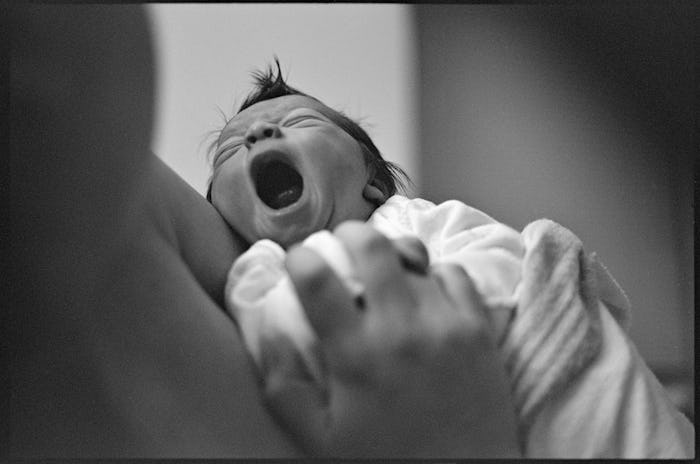Health

Why Are Asian Babies Less Likely To Die Of SIDS?
Sudden Infant Death Syndrome, or SIDS, is scary. It can happen to any infant, and have a major impact on any parent, during their child's first year of life. In 2020 there were 1,389 deaths due to SIDS in the United States, according to the Centers for Disease Control and Prevention (CDC) — and this number can be broken down into demographics. There are a lot of questions surrounding SIDS, what causes it, who is most at risk, and how to prevent it. One component of the SIDS conversation is understanding why Asian babies are less likely to die of SIDS than other races and ethnicities.
The numbers: According to the CDC, SIDS rates even in the U.S. are lowest among Non-Hispanic Asian infants, with a rate of 8.4 for every 100,000 live births. This is compared to American Indian and Alaska Native infants, which are most likely to die of SIDS, with a rate of 75.2 for every 100,000 live births. The contrast is shocking and might have people asking, What are Asian parents doing differently? The answer to that question, like SIDS itself, is much of a mystery.
There unfortunately is no direct answer to why Asian babies, both globally and within the U.S. are less likely to die of SIDS. But according to Childrearing and Infant Care: A Cross-cultural Perspective by Pranee Liamputtong, it could all boil down to cultural differences — such as lifestyles, beliefs, and practices.
Year after the year, Japan is one of the countries with one of the lowest infant mortality rates. There are a few reasons why this may be: They have lower rates of maternal smoking and alcohol consumption — and research has shown that both maternal smoking and prenatal drinking increase a child’s SIDS risk. Factors like these could have a direct influence on the lowered SIDS rate for Asian children. This can be seen in a 2012 study conducted in the United Kingdom, which found that infants with South Asian parents (of Bangladeshi, Indian, and Pakistani descent) in the UK had a lower rate of SIDS over white British infants. At the end of the study, researchers were able to conclude that the South Asian parents that were observed were more likely to protect their infants from major SIDS risks such as exposure to maternal smoking and alcohol consumption, and less likely to let their infant sleep in a room alone.
Sleeping habits could also contribute to why Asian babies are least likely to die of SIDS. Studies have shown that bed sharing is unsafe and could lead to SIDS (the American Academy of Pediatrics is strongly against it). But what about safe co-sleeping arrangements? First, it is important to note that co-sleeping is not necessarily the same as bed sharing. Some Asian cultures that traditionally share sleep (where babies sleep in the same room or bed as their parents) have low infant mortality rates, and Dr. William Sears says this shows that safe co-sleeping can lower the risk of SIDS — yes, you read that right.
There are a few theories why: If a baby’s wellbeing is threatened for any reason and they do not wake, the nearby parent will possibly subconsciously sense that their baby’s health is in danger and needs to be roused. Another reason is that babies who breastfeed and co-sleep are more likely to stay on their back while sleeping for easy access to the food source.
Sleeping habits vary by culture, even throughout the very diverse continent of Asia. For example, a 2014 study conducted by the Korean Society of Sleep Medicine found that parents in Korea were likely to sleep with their children on the floor — and that this did not carry the same SIDS risk level as bed sharing. Many Asian cultures in fact believe that babies should not sleep in their own room.
The way parents put their children to sleep is learned behavior, passed down from their parents or cultures. Asian families are no different — and their cultural behavior could account for why Asian babies are the least likely to die of SIDS.
Studies referenced:
Suzuki, Shunji. (2022) Habitual Smoking and Perinatal Outcomes in Japan. https://www.ncbi.nlm.nih.gov/pmc/articles/PMC8862612/
Helen L Ball , Eduardo Moya, Lesley Fairley, Janette Westman, Sam Oddie, John Wright. (2011) Infant care practices related to sudden infant death syndrome in South Asian and White British families in the UK. https://pubmed.ncbi.nlm.nih.gov/22150702/
Robert Carpenter , Cliona McGarvey, Edwin A Mitchell, David M Tappin, Mechtild M Vennemann, Melanie Smuk, James R Carpenter. (2013) Bed sharing when parents do not smoke: is there a risk of SIDS? An individual level analysis of five major case-control studies. https://pubmed.ncbi.nlm.nih.gov/23793691/
This article was originally published on